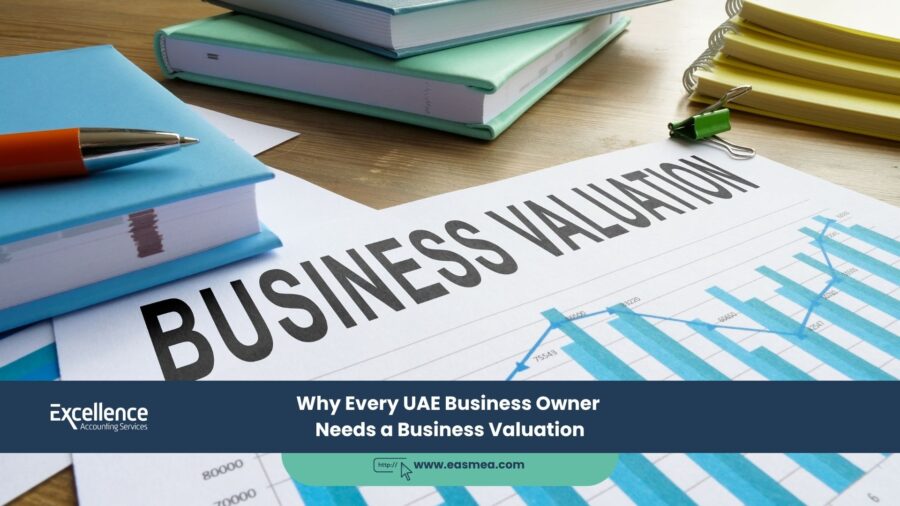Why Every UAE Business Owner Needs a Business Valuation
Ask a business owner in the UAE what their company is worth, and you might get a number based on annual revenue, recent profits, or simple gut feeling. Many entrepreneurs view a business valuation as a one-time event, something to be done only when they are ready to sell their company. This is one of the most significant strategic misconceptions in the business world.
A professional business valuation is not just a price tag; it’s a comprehensive health check. It’s a strategic tool that provides a deep, objective understanding of your company’s financial health, competitive position, and hidden potential. In the dynamic and sophisticated UAE market, knowing your company’s true value is fundamental to making informed decisions, mitigating risks, and seizing growth opportunities.
Whether you are seeking investment, planning for the future, navigating a partnership, or simply aiming to build a more resilient and profitable enterprise, a valuation provides the critical data you need. This guide will explore the compelling reasons why every UAE business owner should consider a valuation not as a final step, but as a crucial part of their ongoing strategic toolkit.
Key Takeaways
- More Than a Sale Price: A valuation is a strategic tool for decision-making, not just an exit requirement.
- Unlock Growth Capital: A credible valuation is essential for attracting investors and securing bank financing on favorable terms.
- Informed Strategic Planning: Understanding what drives your company’s value allows you to focus on the activities that will increase it the most.
- Fairness in Partnerships: Valuations provide an objective basis for shareholder agreements, buy-sell agreements, and resolving partner disputes.
- Essential for M&A and Exit Planning: Whether buying or selling, a professional valuation ensures you are negotiating from a position of strength.
- Compliance and Risk Management: Valuations are increasingly important for tax compliance (e.g., Corporate Tax) and financial reporting.
7 Critical Reasons for a Business Valuation in the UAE
Understanding the “why” behind a valuation reveals its true power as a management tool.
1. Strategic Planning and Performance Improvement
A valuation report is a roadmap to value creation. The process forces you to look beyond the daily operations and analyze the key drivers of your company’s worth. These drivers often include recurring revenue streams, customer concentration risk, strength of management, and operational efficiency. By understanding these components, you can develop a strategic plan that focuses on enhancing them, thereby systematically increasing your company’s value over time. This is a core component of our strategic CFO services.
2. Securing Investment and Financing
If you plan to raise capital from angel investors, venture capitalists, or even secure a significant bank loan, a professional business valuation is non-negotiable. Investors need an objective assessment of what the business is worth to determine the equity stake they will receive for their investment. Banks will use it to assess the company’s assets and overall financial health. A credible, third-party valuation demonstrates professionalism and gives potential financiers the confidence to invest in your vision.
3. Mergers & Acquisitions (M&A)
Whether you are looking to acquire another company or are considering an offer to be acquired, a valuation is the cornerstone of the negotiation.
– As a Buyer: A valuation of the target company ensures you don’t overpay and helps you structure the deal. It’s a key part of the due diligence process.
– As a Seller: Knowing your own company’s defensible value allows you to enter negotiations with confidence and justify your asking price, preventing you from leaving money on the table.
4. Shareholder and Partnership Agreements
For any business with multiple owners, a valuation is essential for maintaining fairness and preventing disputes. It’s used to establish buy-sell agreements, which are contracts that dictate what happens if a partner wants to leave, passes away, or becomes disabled. By agreeing on a valuation formula or a process for regular valuations in the partnership agreement, you create a clear, predetermined mechanism for pricing shares, avoiding contentious and costly negotiations down the line.
A business valuation turns subjective opinions about worth into an objective, data-driven conversation. It is the language of investors, partners, and strategic decision-makers.
5. Succession and Exit Planning
Every business owner will eventually exit their business. A valuation is the first step in any succession plan, whether you intend to pass the business to family members, sell to employees, or sell to a third party. It establishes a baseline value, allowing you to track progress towards your financial exit goals and helps in structuring a transition plan that is fair to all parties and tax-efficient.
6. Tax Compliance and Financial Reporting
With the introduction of UAE Corporate Tax, valuations have taken on a new level of importance. They may be required for various tax-related purposes, such as justifying transactions between related parties (transfer pricing) or during corporate restructuring. For financial reporting under International Financial Reporting Standards (IFRS), valuations are necessary for impairment testing of goodwill and other intangible assets.
7. Employee Stock Ownership Plans (ESOPs)
If you want to attract and retain top talent by offering them a stake in the company through an ESOP, you need a formal valuation. An independent valuation is required to set the strike price for stock options, ensuring the plan is fair, transparent, and compliant with legal standards.
Understanding Valuation Methods
A professional valuator doesn’t just pull a number out of thin air. They typically use a combination of recognized methodologies to arrive at a defensible conclusion of value.
- Discounted Cash Flow (DCF) Method: This forward-looking approach forecasts the company’s future cash flows and discounts them back to their present value. It’s heavily based on the company’s potential to generate cash in the future.
- Market Approach: This method compares your business to similar companies that have recently been sold or are publicly traded. It relies on finding comparable transactions or “comps” to derive a valuation multiple (e.g., a multiple of revenue or EBITDA).
- Asset-Based Approach: This approach calculates the net asset value of the company by subtracting its total liabilities from the fair market value of its total assets. It’s often used for asset-heavy businesses or in liquidation scenarios.
A credible valuation report will typically consider at least two of these methods to arrive at a final, blended valuation range.
How Excellence Accounting Services (EAS) Determines Your True Worth
A business valuation is a complex process that requires deep financial expertise and market knowledge. At EAS, we provide comprehensive valuation services tailored to the unique needs of UAE businesses.
- Professional Business Valuation: Our experts use multiple methodologies to deliver a detailed, defensible valuation report for any purpose, from M&A to strategic planning.
- Due Diligence Services: When you’re considering an acquisition, our financial due diligence services scrutinize the target company’s financials to validate its valuation and uncover any hidden risks.
- Feasibility Studies: Before you invest in a new project or venture, we can assess its financial viability, which often includes a valuation of the potential future enterprise.
- Strategic CFO Advisory: Our fractional CFOs don’t just help you understand your valuation; they help you create and execute a plan to increase it.
Frequently Asked Questions (FAQs)
The cost varies significantly based on the complexity of the business, the purpose of the valuation, and the level of detail required in the report. A valuation for internal strategic planning might be less expensive than one required for a formal M&A transaction or litigation. It’s best to consult with a professional firm to get a quote based on your specific needs.
Typically, a valuation can take anywhere from two to six weeks from the initial engagement to the delivery of the final report. The timeline depends on how quickly you can provide the necessary financial documents and the responsiveness of your management team to questions from the valuator.
You will generally need to provide at least three to five years of historical financial statements (income statement, balance sheet, cash flow statement), your current year’s interim financials, future financial projections or budgets, a breakdown of your products/services and customers, and details of any key contracts or agreements.
No. An appraisal determines the value of a specific tangible asset (like a building or a vehicle). A business valuation determines the value of the entire business as a going concern, which includes not only all its tangible assets but also its intangible assets like brand reputation, customer relationships, intellectual property, and future earning potential.
Corporate Tax directly impacts the future cash flows of a business, which is a key input in the Discounted Cash Flow (DCF) method. A 9% tax on profits reduces the net cash available to shareholders, which will generally lower the valuation compared to a pre-tax scenario. A professional valuator will factor the corporate tax liability into their models to arrive at an accurate, post-tax valuation.
While online calculators can provide a very rough, ballpark estimate, they are not a substitute for a professional valuation. They cannot understand the nuances of your business, the specifics of the UAE market, or the purpose of the valuation. For any serious strategic, legal, or financial purpose, a generic online calculation will lack credibility and will not be accepted by investors, banks, or courts.
For strategic purposes, it’s a good practice to have a valuation updated every one to two years. This allows you to track your progress and make adjustments to your strategy. You should also seek a new valuation whenever a major event occurs, such as a significant change in the market, a new competitive threat, or before entering into any major transaction.
Enterprise value is the value of the entire business operations, belonging to all stakeholders (equity holders, debt holders). Equity value is the value that belongs solely to the shareholders. It is calculated by taking the enterprise value and subtracting the company’s debt and adding its cash. When you hear about a company being sold for a certain price, that price typically refers to the equity value.
Yes, absolutely. For many service businesses, the value is not in the tangible assets but in the intangible ones: recurring revenue from long-term contracts, a strong brand, a skilled workforce, and loyal customer relationships. A valuation using the DCF or Market Approach would capture this value, which an asset-based approach would miss entirely.
A valuation provides a defensible range of what your business is worth based on objective financial data and market conditions. The final selling price, however, can be influenced by negotiation, the strategic value to a specific buyer (synergies), the structure of the deal, and overall market demand. The valuation gives you the crucial, data-backed starting point for those negotiations.
Conclusion: Know Your Worth, Drive Your Future
In the fast-paced UAE economy, intuition and hard work can only take you so far. To build a truly valuable and enduring enterprise, you need to operate with a clear, objective understanding of your company’s worth. A professional business valuation provides this clarity.
It transforms your perspective, moving you from simply running a business to strategically building a valuable asset. By embracing valuation as a regular strategic exercise, you empower yourself to make smarter decisions, negotiate from strength, and confidently steer your company toward a more prosperous future.
What's Your Business Really Worth?
Let our experts provide you with the insights you need to drive strategic growth, attract investment, and plan for a successful future.




